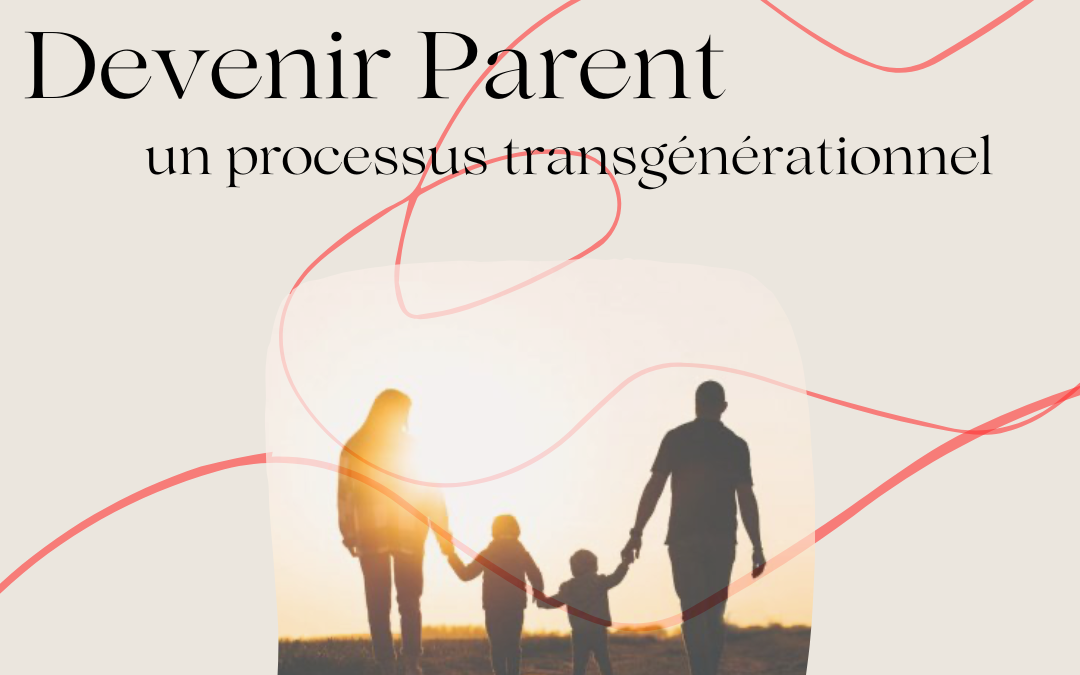Becoming a parent" already implies the idea of a process. A process in which the idea of transmission is central. Parenthood cannot be envisaged without transmission. As mentioned in the article "The systemic approach, the common thread between myself and others"This is not the only framework in which this dynamic appears, but in every interaction with the Other.
But what actually happens? Why is it that some people can imagine themselves as parents without a care in the world, while for others it may be inconceivable?
The very concept of parenthood summons up our own parents, and consequently the child we once were and still are. This brings us face to face with our paternal and maternal bonds, and how we have invested them, despite their flaws and qualities. This reactivation, conscious on the one hand and unconscious on the other, inevitably leads us to define our parental posture in a singular way.
We can identify two dimensions: that of the narcissistic and the repair. The adult conceives of a being with his or her partner who, in fantasy, is a part of them. In other words, it's an imaginary extension of their own being. The inherent legacy is one of narcissistic continuity. This child carries within him a representation of the two families from which he will come. He or she will resemble one or the other, and may be recognized as having similarities in character and physique to his or her ancestors.
The second dimension, that of reparation, is in a way the narcissistic needs of the parents that could not be fulfilled as children. This process reactivates the children they once were, and the wounded child they may still be today. In these relationship issues, the child's unheard needs may intrude, requiring special care so that this time they can be met. However, the risk is that we may no longer be able to listen and respond to the specific needs of the real child.
Numerous studies have been carried out on the toxic, traumatic transmission, impossible mourning on a transgenerational level. These particularities in the parent's history lead to the development of very specific attachment modalities. What we call attachment modality is the way in which the Parent-Baby relationship has been established. What we observe is that, through this bond, the parent's infantile history is repeated.
The stakes are high and often guilt-ridden for parents.
Could this be an impossible role?
Some people are so preoccupied with being the best parents they can be, that the anxiety they feel inevitably permeates their child(ren). Others, responding to their own childhood patterns, will try to go against the grain and invest in the opposite model they received. However, both are in reality subject to their internalized model.
Could there be a guide on how to be the best parent?
What if, in reality, all it took was to be "just a good enough parent" ?
This expression comes from D. Winnicott, "Good Enought Mother", an Anglo-Saxon pediatrician and psychoanalyst. There's no such thing as a perfect pattern. The challenges of parenthood can lead to a profound sense of loneliness. Inevitably, this passage of life leads us to envisage your future differently. There's a before and an after, and support may be needed to make the transition as stress-free as possible.
The key words are benevolence towards oneself and others self-knowledge that we nurture through real introspection and thelistening and attentive to your child. These words are far from exhaustive, and sometimes simply agreeing to surround yourself with the right people can be a real help.
Bibliography
Ciccone, A. (2014). Psychic transmission and transmission fantasy. La parentalité à l'épreuve. Cahiers de psychologie clinique, 43, 59-79.
Winnicott D. W, 1956, La Mère suffisante bonne, Paris, Petite Bibliothèque Payot, 2006.
Solis-Ponton, L. (2002). La parentalité: Défi pour le troisième millénaire. Presses Universitaires de France.



